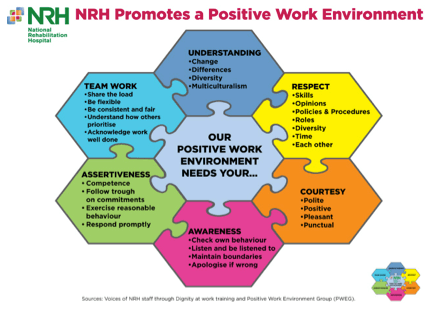Rosemarie Nolan describes how surveys indicated that staff satisfaction improved in the National Rehabilitation Hospital in Dun Laoghaire following the introduction of the Work Positive Project.

“There is increasing evidence that links employee engagement to employee wellbeing, patient satisfaction and clinical outcomes…. Accordingly, by safeguarding our own physical and mental wellbeing we can ensure the highest standard of patient care and maintain superior standards of professional practice.”1
For Healthcare organisations, the ultimate benefit of successful employee engagement (improved outcomes for patients as a result of staff wellbeing) can be attributed to the cumulative effect of:
- staff retention
- reduced work-related stress and absence
- greater staff involvement and ownership of major organisational change leading to increased confidence in the organisation’s future
- dispelling the notion of ‘Us versus Them’
- a healthy and productive workforce leading to innovation, improved activity and outcomes, and pride in the organisation.
Major change is a now a constant, both within the wider healthcare system and in individual organisations. Employee engagement, underpinned by quality communications systems, is vital in this ever-changing climate. Reduced numbers of frontline staff, greater and more complex demands on services, and the resounding request to ‘do more with less’ is certain to increase stress and anxiety levels even in the most dedicated of workforces.
The NRH employs over 400 staff in a progressive, fast-paced interdisciplinary working environment.
The National Rehabilitation Hospital (NRH) in Dún Laoghaire, Co. Dublin has been involved in the Work Positive Project (developed by the Health and Safety Authority in partnership with the Health and Safety Authority Northern Ireland and Health Scotland) since 2012.
The hospital has now completed three Work Positive Profile annual staff surveys, and subsequently developed and implemented many successful initiatives under its own Work Positive Environment project.
The NRH employs over 400 staff in a progressive, fast-paced interdisciplinary working environment. Recognising the high demands and stresses associated with substantial ongoing change, the hospital, through its Occupational Health Department has provided stress management support, including an Employee Assistance Programme, to all staff.
The hospital has certainly undergone major organisational changes in recent years, and continues to do so. In seeking CARF Accreditation2, it changed from a Departmental to a Programmatic model of delivering its services, which significantly impacted staff in all areas of the hospital. Uncertainty caused by the economic climate and many very experienced staff leaving the system under the early retirement and redundancy schemes produced further concerns for staff.
The announcement that a new 120 bed replacement hospital is to be built on the NRH campus is wholeheartedly welcomed by all.
The announcement that a new 120 bed replacement hospital is to be built on the NRH campus is wholeheartedly welcomed by all, yet this major project will undoubtedly impact the work environment significantly during the transition and change management period. To ensure any potential staff issues or concerns are addressed as they arise, employee engagement has been, and will continue to be a key part of the process. Throughout the design phase, staff have been involved in consultations, end-user focus groups, and testing of prototype rooms and equipment, and updates are communicated across the organisation at all key milestones of the project through the hospital’s CASCADE communications system.
In order to identify and address the sources of work-related stress and stresses related to major change, the Work Positive Profile survey was first made available to all staff in 2012.
The Survey Report was subsequently presented to Executive Management by Dr Robert Kerr, University of Ulster and while the hospital scored high in many areas, such as peer support, certain areas were also identified for improvement.
Management discussed and explored the findings, and a working group was established to oversee the development and implementation of a Positive Work Environment Quality Improvement Plan at the NRH.
In addition to the findings of the survey report, feedback from ten staff focus groups provided valuable information to the organisation. Additional training and supports were put in place with the objective of improving the positive working environment for all staff.
To date, the Quality Improvement Plan to create a Positive Work Environment has included the following:-
- Dignity at Work Training was provided for all staff members, beginning with Senior Management and Consultants. The attendance rate for this training was 87%.
- Conflict coaching was provided for Senior Managers.
- Development of a Positive Workplace Behaviours Protocol (based on comments and feedback received from attendees at the Dignity at Work Training)
- Championing of Positive Workplace Behaviours
- Celebrating NRH Staff Achievements – establishment of the annual ‘Staff Recognition Day Showcase’
A second Positive Work Profile survey was carried out in 2013. The NRH responses were benchmarked against 136 other organisations across Ireland and the UK. As with the first survey, it looked at how staff’s ability to do their job can be impacted upon by the current work environment.
In this follow up survey, the hospital scored in the top 20 of organisations surveyed in 14 out of 35 categories strongly suggesting that NRH staff satisfaction has dramatically improved. A third survey was carried out in December 2014 and the hospital is awaiting the results.
Maintaining a Positive Work Environment is a challenge that the NRH is committed – it is an ongoing journey of continuous improvement.
‘Engage’ can be defined as: involve, participate and retain; it can also mean to battle – in these times of rapid change and technological revolution, managers are acutely aware that for an organisation to be the best it can be, it needs to have the best employees; perhaps the battle to retain the best and brightest staff requires that dynamic Employee Engagement is included as a key component of the organisational strategy.

1 The Interdisciplinary Team: Staff Wellbeing Advancing in a Common Direction: Winning poster at the MASCIP 16th Annual Conference, 2014, Dockery, M., Lynch, J., MacGowan, S., Colgan, L., Ronglo, S., McKeever, S., Fitzsimons, L., O’Donovan, N., Marsh, F., Thomas, A., Abraham, T., Nolan, M., Smith, E. National Rehabilitation Hospital, Dún Laoghaire, Co. Dublin.
2 The NRH is accredited by CARF (Commission for Accreditation of Rehabilitation Facilities) for a range of services, confirming they meet recognised international standards in all the clinical and business work practices involved in the delivery and development of those services.
For more information on the National Rehabilitation Hospital visit www.nrh.ie

